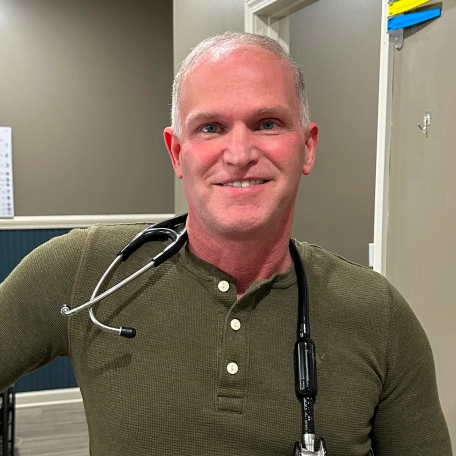Medicare Population
Medicare Advantage consumers are a growing population with unique needs that are well-served by our whole-health approach. With a focus on working together with care providers, we believe we can make whole health a reality for the people we mutually serve, including those with Medicare plans.
Our affiliates' Medicare Advantage (MA) health plans serve close to 2 million Americans in 25 states and Puerto Rico.1 Through our relationships with National Value Partners and other strategic initiatives, we have demonstrated that care providers' payment arrangements support a path of reducing costs, improving quality, and maintaining and managing wellness for Medicare consumers.

Health Measures for Consumers in Value-Based Programs Versus Those Who Are Not
When it comes to health measures, our data shows a stark difference for consumers in value-based programs versus those who are not. Results improve even more when care providers take on shared risk. Among our affiliated health plans' Medicare population:2
- Annual Planned Visits %: Difference Between Medicare Value-Based Care Versus Non-Value-Based Care: 13.6%, Difference Between Medicare Shared-Risk-Value-Based Care Versus Non-Value-Based Care: 14.4%
- Colorectal Cancer Screenings %: Difference Between Medicare Value-Based Care Versus Non-Value-Based Care: 7.8%, Difference Between Medicare Shared-Risk-Value-Based Care Versus Non-Value-Based Care: 8.7%
- Controlling Blood Pressure %: Difference Between Medicare Value-Based Care Versus Non-Value-Based Care: 21.5%, Difference Between Medicare Shared-Risk-Value-Based Care Versus Non-Value-Based Care: 23.1%
- Diabetes Blood Sugar Control %: Difference Between Medicare Value-Based Care Versus Non-Value-Based Care: 19.2%, Difference Between Medicare Shared-Risk-Value-Based Care Versus Non-Value-Based Care: 20.1%
- Transitions of Care - Medication Reconciliation Post-Discharge %: Difference Between Medicare Value-Based Care Versus Non-Value-Based Care: 12.9%, Difference Between Medicare Shared-Risk-Value-Based Care Versus Non-Value-Based Care: 14.4%
Primary Care Partnerships
We recognize that while shared-risk arrangements deliver the best results, it can be challenging for smaller primary care practices, in particular, to take on risk for their patient population enrolled in Medicare Advantage health plans.
That's why our value-based care strategy in Medicare includes work with organizations we refer to as National Value Partners (NVPs). These are large-scale, industry-leading organizations that assume risk on behalf of independent care providers and enable them through various tools and resources to better manage patient populations. More than ninety percent of Medicare Advantage spend with NVPs is under shared-risk arrangements, further accelerating shared incentives that drive performance toward an improved patient experience and better quality and cost outcomes.3
We've leveraged these partnerships to ensure all consumers receive the care they need, regardless of health status or geography, including rural areas. National Value Partners:
- Enable independent primary care physicians (PCPs) to remain independent by aligning small and medium practices, across multiple lines of business, with physician aggregators. These aggregators provide analytics, technical support, and other capabilities to support care providers in delivering superior care and succeeding in risk-based arrangements.
- Support care providers to focus on consumers' whole health, including the behavioral and social drivers that impact their health.
- Accelerate Medicare growth through positive consumer experiences, Star Ratings, cost-of-care performance, and consumer retention.
All our NVPs focus on supporting vulnerable independent care providers, as well as consumers at risk for poor health outcomes, including those with chronic and complex health conditions and/or experiencing health inequities, which are fast-growing issues in rural America.

Value-based care can provide significant benefit to care providers in the form of more visibility and less volatility in medical cost, improved patient experience, and expanded patient access to care. While the program is in its second year, current NVPs trends show:4
Many partners improving year-over-year on clinical quality.
Significant membership growth, both organic as well as new to value.
Increasing geographical breadth of the NVPs to expand consumer access to value-based care providers.
Medicare Value-Based Program Results National Value Partners Versus Non-National Value Partners
In 2023, we saw:5
Growth — While overall Medicare Advantage membership growth in 2023 was 3.3%, NVP membership grew by 9.3%.
Better Outcomes — Projected 2023 Medicare Stars performance is 16% better for NVPs compared to non-value-based care groups and is 3% higher for NVPs compared to other value-based care groups.
1 Elevance Health, internal reporting (2023). 2 Elevance Health, internal reporting (2022). 3 Elevance Health, internal analysis (2023). 4 Elevance Health, internal analysis (December 2023). 5 Elevance Health, internal reporting (February 2024).
Medicaid Population
Learn how we design contracts for care providers serving this group

